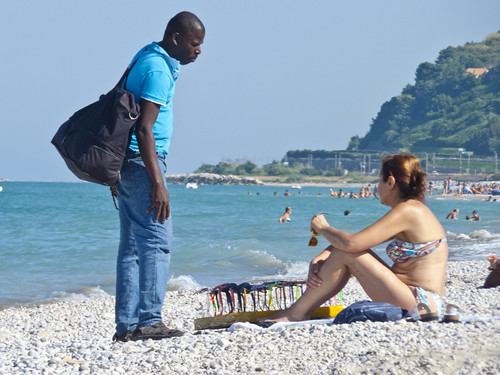Despair Subtly Growing – June 2013
One day there will be a story to be told, a story of reminiscences, from a group of people that at the moment no one seems interested in. No one apart from me, but there will always be the odd one or two who are kind of the weirdos of their time.
There have always been the poor forgotten people. Historians wish they had more information about the ordinary everyday people, through every decade of history. And yet we have a history being made, in front of our eyes, and no one seems to see it.
There is massive migration going on in these times, greater than anything known to have happened before. Every migrant is an individual story of course, but as in the past there are migrant groups, categories of people who do not all find themselves in identical positions, but do tend to land up in similar positions, and these groups will have - are bound to have - an impact on the future, and it is when that impact becomes recognised that the historians will say: I wish someone had logged this down at the time.
In 2005 a novel was published in the UK called A History of Tractors in Ukrainian. The year’s sensation, the critics crowed, so hilarious, so amusing. I did not find it hilarious or amusing at all. I found it rather sad and a poignant picture of a particular migrant group: Ukrainians living in Peterborough. The critics, it seemed to me, were glossing over the surface in a typically shallow chattering-classes type of way: superficial.
It has happened again with a novel called Capital by John Lanchester, in this case covering, among other things, African, Polish and Pakistani migrants living in London. I have no doubt this book has been thoroughly researched for its factual accuracy and observation of language and customs. Hilarious, reported the critics. I found nothing to laugh at in it at all. Sadly poignant, say I. It’s a big book and I read it in about four sittings. Recommended.
Ricky the Nigerian is still spending his days standing outside the local supermarket in Piane di Falerone, just down the hill from us here in Santa Vittoria. This is his sixth year here and every day he stands at the door of the supermarket, with some socks, hats and teatowels for sale, and helping people put their shopping in their cars, whether they need that help or not, in the hope of a tip of a euro or two.

Ricky surveys the scene.
Ricky could go somewhere else. He could cross the border into Austria and Germany without too much trouble as there are no visible border controls. But once he got there then what would he do? At least where he is people shout, ‘Ciao Ricky’, and a fair number do give him some money, as I do, though in a way some of my donation is in exchange for information, other parts of it are in the hope of helping his wife and children in Nigeria.
It has been a hot few days, an afa, warm air coming north from Africa. Ricky commented on how hot it was, as his lifted his hat and mopped the beads of sweat from his shaved head.
‘Do you ever get the chance to get down to the sea on the days when you are not standing here?’, asked Hilary, ‘Cool off a little in the sea like so many people do’.
Ricky’s ever-smiling and cheery face turned to horror for a moment and he held his hands in a pushing-away gesture. ‘I cannot go near the sea’, he said.
Ricky came to Italy from Libya in a small, overcrowded, open boat. A number of people died on the journey and were thrown overboard. He clearly found the experience absolutely terrifying and expected not to survive. It will take a long time before Ricky can look at the sea again.
Yet alongside the sea, on the beaches, the African traders selling cheap sunglasses, dresses and handbags march back and forth, there is seldom a moment when there is not at least one in sight, often there are four or five. They must have come to terms with the sea, though admittedly they never have to actually go into it.
These hordes, these street traders and beach traders and people such as Ricky who has got himself a pitch: what is going to happen to them?
All I can detect at the moment is an increasing aura of despair. It’s subtle, and it comes and goes, and people such as Ricky stay extraordinarily cheerful most of the time. But it’s there, a feeling of hopelessness, of there seeming to be no way forward – or back for that matter. And it must get a little harsher as the months pass by.

This bloke’s face says it all. Italian beaches, and streets and just about everywhere are awash with African and Asian migrants trying to sell something. An awful job. Notice that the woman he is hoping for a sale from has a well-fed belly.
Marina Palmense, Italy.
One day some stories will be told, and many people will wish someone had asked more at the time.
No comments:
Post a Comment